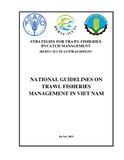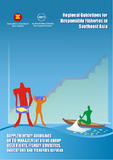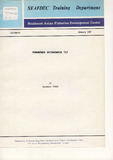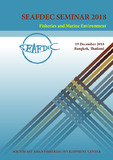National Guidelines on Trawl Fisheries Management in Vietnam
Description
The Code of Conduct for Responsible Fisheries (Food and Agriculture Organization of the United Nations, FAO, 1995) calls for the sustainable use of aquatic ecosystems and requires that fishing be conducted in the environment friendly manners. The Code also promotes the maintenance, safeguarding and conservation of biodiversity of ecosystems by minimizing fisheries impacts on non-target species and the ecosystem in general. However, despite the Code’s endorsement by all FAO Members, there is growing global concern that levels of fishing mortality as a result of bycatch and discards threaten the long-term sustainability of many fisheries and the maintenance of biodiversity in many areas, resulting in increased food insecurity and adversely affecting the livelihoods of fishing communities and fish workers dependent on fish resources.
The call for action to manage bycatch and discard to ensure the sustainable fisheries development is highlighted in the FAO International Guidelines on Bycatch Management and Reduction of Discards, endorsed by the Committee on Fisheries (COFI) at its twenty-ninth session in 2011. Consequently, states, sub-regional and regional fisheries management organizations (RFMOs) and other relevant international organizations were urged to reduce or eliminate bycatch, catch by lost or abandoned gear, fish discards and post-harvest losses, and to support studies and research that will reduce or eliminate bycatch of juvenile fish.
Trawl fisheries are among the most productive fisheries in the world and in Viet Nam, trawling is one of the most important fishing methods, with an estimated of about 20,000 trawlers operating in the country. The recent increase in fish meal production and in other fish products coming from trawl fisheries in Viet Nam can be attributed to increase in fishing effort and expansion of the geographical range of fishing activities, and to the retention of most of the fish caught (including shorter-lived, small-sized, fast-recruiting species). The rapid increase in trawl fishing effort in Viet Nam can therefore lead to significant problems on the fisheries sustainability. Attempts at regulating and controlling this development have so far been weak and ineffective mainly because of non-compliance, limited enforcement and fishers’ lack of awareness of regulations.
As catch rates and profits have declined, ecosystems have been altered, and conflicts between trawl fishers and other users of the resources, especially small-scale artisanal fishers, have become a common occurrence.
Fisheries management aims to increase the social, environmental and economic benefits from harvesting natural fisheries resources. It attempts to reduce the negative impacts of the many complex issues that affect the sustainable development of fisheries. The situation today in Viet Nam in trawl fisheries is that it catches large quantities and a great diversity of fish and shrimp to fulfill market demands, with very little discarding. Data that would allow the accurate categorizing of landings for various uses are unavailable.
The trawl sector provides very significant incomes and economic wellbeing for many local communities in the entire country. It provides large number of jobs directly in the sector and an even larger number in related industries such as fish meal factories, processing plants, transport, refrigeration, and supporting services.
However, the expansion of trawl fisheries has reached a limit as there are no new, unexploited fishing grounds available. Although there are some possibilities for expansion into deeper waters, it is well known that these areas have lower diversity and quantities of fish than shallower fishing grounds. The outcome is almost certain: those trawlers would soon return to depleted near-shore areas.
The contribution of trawl fisheries to fish production, occupations and income generation is counter balanced by concerns about the sustainability of catches and ecosystem impacts. As a consequence, these fisheries require careful management underpinned by sound information and solid enforcement to support a transition to sustainable trawl fisheries management and practices.
These guidelines are targeted primarily at fishery departments and institutions that are tasked with fishery management at national and provincial levels in Viet Nam. The guidelines are expected to provide concrete advice on options that are available to address typical issues facing tropical trawl fisheries in Viet Nam. A second purpose of the guidelines is to increase understanding of the issues of Vietnamese trawl fisheries and the ways that they can be managed. It is intended that other stakeholders in the fishery and market chain will better understand how management processes can be supported and implemented. This improved understanding will enable stakeholders to engage more effectively with fishers and fishery managers in addressing their particular concerns about fishery management, resource use and sustainability.
Citation
National Guidelines on Trawl Fisheries Management in Vietnam. (2015). Training department, Southeast Asian Fisheries Development Center.
Subject
Collections
- Country Activities [95]
Related items
Showing items related by title, author, creator and subject.
-
Regional Guidelines for Responsible Fisheries in Southeast Asia Supplementary Guidelines on Co-Management Using Group User Rights,Fisheries Statistics, Indicators and Fisheries Refugia
SEAFDEC,ASSOCIATION OF SOUTHEAST ASIAN NATIONS (SEAFDEC, 2006-03)The Guidelines on “Use of Indicators for the Sustainable Development and Management of Capture Fisheries” which is to large extent related to fishery statistics, was developed to complement the programs on statistics, thus, ... -
Fisheries Economics (I)
Yamao, Masahiro (Training Department, Southeast Asian Fisheries Development Center, 1987-01)This textbook was initially prepared as part of the lectures on Fisheries Economics at SEAFDEC, in 1986. The contents are obviously not only introductory but also essential to our subject. In addition to my summarized ... -
SEAFDEC Seminar 2018: Fisheries and Marine Environment
Southeast Asian Fisheries Development Center, Training Department (Training Department, Southeast Asian Fisheries Development Center, 2018)Proceeding of SEAFDEC Seminar 2018: Fisheries and Marine Environment




